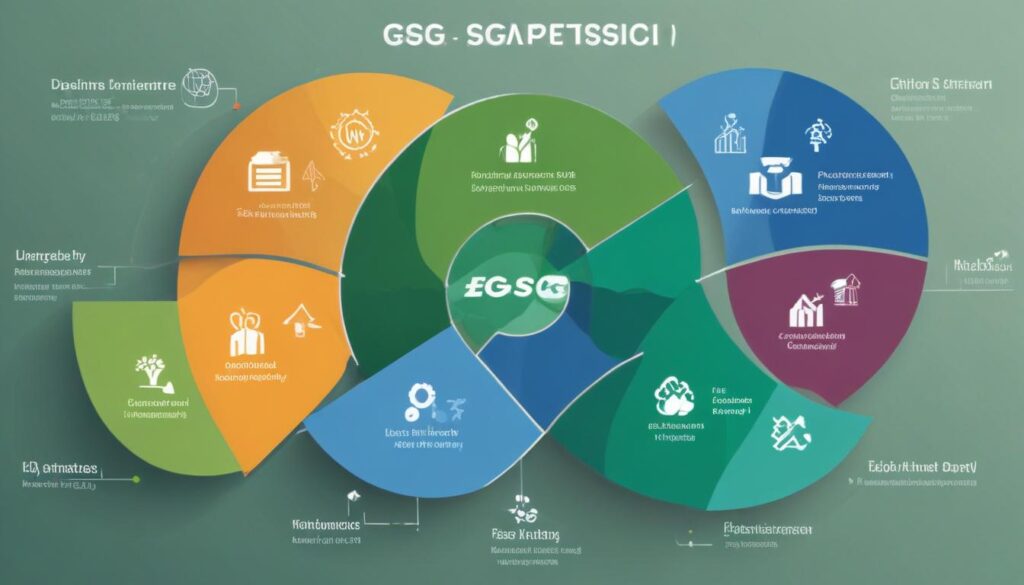ESG reporting requirements are essential for companies to disclose their environmental, social, and governance practices, enhancing transparency, building stakeholder trust, and ensuring compliance with regulatory expectations across various industries.
Have you ever wondered how the ESG reporting requirements differ across various industries? Understanding these nuances is crucial for businesses aiming to enhance transparency and sustainability.
What are the ESG reporting requirements for different sectors?
The ESG reporting requirements can significantly differ across various sectors, reflecting the unique challenges and responsibilities of each industry. Understanding these differences is crucial for companies aiming to comply with regulations and enhance their sustainability practices.
In sectors such as finance and banking, for example, the focus is often on governance, risk management, and transparency. Firms in this industry are required to disclose their environmental impacts, social contributions, and governance structures to maintain investor trust.
Conversely, in the manufacturing sector, the emphasis leans more heavily on environmental impacts, particularly concerning emissions, waste management, and resource efficiency. Companies are expected to track and report their carbon footprint and other significant environmental metrics to comply with increasingly stringent regulations.
The energy sector faces its own set of challenges, often highlighting renewable energy initiatives and community engagement. Here, ESG reporting includes not only the shift towards greener energy sources but also the social implications of energy production on local communities.
Moreover, the technology sector is increasingly focusing on data privacy and ethical governance, reflecting the growing importance of responsible data management and consumer trust. Companies must demonstrate how they handle data responsibly while also considering their broader societal impact.
In summary, the ESG reporting requirements vary by industry but generally include the following:
- Finance: Governance and risk transparency.
- Manufacturing: Environmental impact and resource efficiency.
- Energy: Renewable initiatives and community engagement.
- Technology: Data privacy and ethical governance.
Understanding these differences enables businesses to tailor their ESG strategies effectively and meet compliance demands while enhancing their reputation and accountability.
Source: Various industry reports and published guidelines.
How do ESG reporting standards vary between industries?

Understanding how ESG reporting standards vary between industries is essential for companies aiming to align their practices with stakeholder expectations and regulatory requirements. Each sector faces unique challenges, which shape its reporting obligations.
For instance, the financial services sector places a premium on governance and risk management. These firms are often required to disclose information about their governance structures, how they manage risks related to sustainability, and the impact of their investments on society.
In contrast, the manufacturing industry focuses heavily on environmental metrics. Here, companies must report on their emissions, waste disposal methods, and resource usage, complying with strict regulations aimed at reducing environmental impact.
The energy sector, particularly companies engaged in fossil fuels, has reporting requirements that emphasize environmental compliance and community engagement. They must not only report their CO2 emissions but also outline plans for transitioning towards renewable energy sources.
On the other hand, the technology sector is increasingly held accountable for issues related to data privacy and ethical governance. Organizations are expected to disclose how they collect and use data, ensuring transparency and consumer trust.
To summarize the differences in ESG reporting standards by industry:
- Financial Services: Focus on governance and risk transparency.
- Manufacturing: Environmental impact reporting, including emissions and waste.
- Energy: Emphasis on compliance and community engagement related to sustainability.
- Technology: Accountability for data privacy and ethical practices.
By recognizing these variations, companies can better implement effective ESG strategies tailored to their specific industry needs.
Source: Industry-specific ESG guidelines and reports.
Why is compliance with ESG disclosure requirements important for businesses?
Compliance with ESG disclosure requirements is critical for businesses aiming to establish trust, accountability, and sustainability in their operations. These requirements are not only about meeting regulatory standards; they reflect a company’s commitment to ethical practices and transparency.
First and foremost, adhering to ESG standards enhances a company’s reputation. Consumers and investors are increasingly demanding transparency regarding environmental and social impacts. Companies that actively disclose their ESG practices are perceived as more trustworthy, which can lead to increased customer loyalty and investment opportunities.
Moreover, compliance with ESG disclosure requirements provides businesses with a competitive edge. Firms that prioritize sustainability can differentiate themselves in the marketplace. They attract socially conscious consumers and investors who are willing to pay a premium for products and services that align with their values.
Another key reason for ESG compliance lies in risk management. By adhering to disclosure standards, companies can identify and mitigate potential risks associated with environmental, social, and governance issues. This proactive approach helps prevent financial losses and reputational damage, making the business more resilient in the face of challenges.
Additionally, many governments and regulatory bodies are tightening laws around ESG disclosures. Companies that do not comply risk facing penalties, legal issues, and loss of market access. Therefore, understanding and fulfilling these requirements is essential for long-term sustainability and success.
In summary, the importance of complying with ESG disclosure requirements can be highlighted as follows:
- Reputation Management: Builds trust with consumers and investors.
- Competitive Advantage: Attracts socially conscious clients and investors.
- Risk Mitigation: Identifies and addresses potential risks early.
- Regulatory Compliance: Prevents legal issues and ensures market access.
Compliance with ESG standards is not just a regulatory obligation; it is a strategic imperative that can drive long-term success and promote a more sustainable future.
Source: Corporate ESG frameworks and industry analyses.
Understanding ESG reporting requirements: A sector-by-sector analysis

Understanding the ESG reporting requirements involves a detailed analysis of how these standards apply differently across various sectors. Each industry faces unique challenges and expectations that shape its reporting practices.
In the financial services sector, for instance, the focus is primarily on governance and risk management. Firms are mandated to provide comprehensive disclosures regarding their governance practices and how they handle sustainability-related risks.
Conversely, the manufacturing industry emphasizes reporting on environmental impacts, such as emissions, waste generation, and resource usage. Companies must track and communicate their environmental footprint clearly, complying with strict regulatory frameworks aimed at reducing pollution.
Meanwhile, the energy sector is under scrutiny for its impact on the environment and local communities. ESG reports from energy firms often include details about renewable energy initiatives and community engagement strategies, reflecting their commitment to sustainability.
In the technology sector, the focus has shifted towards ethical governance and data privacy. Companies are required to disclose their practices related to data management, ensuring they maintain transparency and uphold consumer trust.
To summarize the sector-specific requirements, consider the following:
- Financial Services: Emphasis on governance and risk management disclosures.
- Manufacturing: Reporting on environmental impacts and compliance.
- Energy: Focus on renewable initiatives and community relations.
- Technology: Accountability for data privacy and ethical governance.
By dissecting ESG reporting requirements sector by sector, businesses can better navigate the complexities of compliance and leverage their reporting strategies for a sustainable future.
Source: Sector-specific ESG guidelines and reports.
Comparing ESG reporting practices of major industries
Comparing the ESG reporting practices of major industries reveals significant differences in how these sectors approach sustainability and transparency. Understanding these variations can provide valuable insights for companies aiming to improve their own ESG strategies.
In the financial sector, ESG reporting is heavily focused on governance and risk management. Financial institutions are required to disclose their governance frameworks, risk assessment methodologies, and strategies for integrating sustainability into their investment decisions.
The manufacturing industry, on the other hand, emphasizes environmental impact reporting. Companies must account for emissions, energy consumption, and waste management. Many manufacturers now employ lifecycle assessments to quantify their overall environmental footprint from production to disposal.
In contrast, the energy sector is under constant scrutiny regarding its environmental practices. Firms are expected to provide detailed reports on their carbon emissions and the measures they are taking to transition to renewable energy sources. This sector is also increasingly focused on community engagement and the social implications of their operations.
The technology sector tends to highlight data governance and privacy in its ESG disclosures. With increasing regulatory demands regarding data protection, tech companies must illustrate how they safeguard user data and ensure ethical practices in their operations.
To summarize these comparisons succinctly:
- Financial Sector: Focuses on governance and risk management transparency.
- Manufacturing: Emphasizes environmental impact assessments and sustainability initiatives.
- Energy: Details carbon emissions and renewable transitions, alongside community relations.
- Technology: Prioritizes data governance and privacy in its corporate responsibilities.
By analyzing the ESG reporting practices across different industries, companies can glean best practices and adapt their strategies to meet the evolving demands of stakeholders and regulators alike.
Source: Industry-specific ESG reports and frameworks.
The role of ESG data in enhancing corporate transparency

The role of ESG data in enhancing corporate transparency is increasingly recognized as vital for building trust with stakeholders. Companies are now expected to provide clear and accessible information about their environmental, social, and governance practices.
First, ESG data offers a framework for organizations to communicate their sustainability efforts. By systematically reporting their ESG metrics, businesses can demonstrate accountability and commitment to ethical practices. Transparency in these areas can significantly bolster a company’s reputation.
Second, stakeholders including investors, customers, and employees are demanding more insight into corporate behaviors and their impacts on society and the environment. With robust ESG data, companies can meet these demands and engage in more meaningful dialogue with their stakeholders.
Moreover, accurate and detailed ESG reporting enables firms to identify risks and opportunities related to sustainability. By analyzing ESG data, companies can make informed decisions that align with their long-term business strategies and societal expectations.
On a regulatory front, the pressure for enhanced transparency is growing. Governments and regulatory bodies are making it mandatory for companies to disclose their ESG performance. By complying with these requirements, organizations not only avoid penalties but also position themselves competitively in the marketplace.
To summarize, the significance of ESG data for corporate transparency includes:
- Enhanced Reputation: Builds trust with stakeholders through transparency.
- Stakeholder Engagement: Facilitates meaningful communication with investors and customers.
- Informed Decision-Making: Helps companies identify sustainability-related risks and opportunities.
- Regulatory Compliance: Addresses legal requirements for reporting ESG performance.
In conclusion, effectively leveraging ESG data is essential for businesses aspiring to become transparent and responsible corporate citizens.
Source: Corporate ESG frameworks and sustainability studies.
In Summary, Embracing ESG Practices is Essential
In today’s business world, understanding and implementing effective ESG reporting practices is crucial for companies of all sizes. By focusing on transparency and accountability, businesses can build trust with their stakeholders and enhance their reputations.
Employing ESG data allows companies to communicate their sustainability efforts effectively, engage meaningfully with investors and customers, and make informed decisions that align with their values and goals.
As regulations continue to evolve, having a strong ESG framework not only ensures compliance but also positions companies as leaders in sustainability. This commitment can drive long-term success while making a positive impact on society and the environment.
Therefore, companies should prioritize their ESG strategies and take proactive steps towards a more transparent and responsible future.
Frequently Asked Questions about ESG Reporting Requirements
What are the main components of ESG reporting?
ESG reporting typically encompasses three key areas: environmental impact, social responsibility, and governance practices. Companies report on their carbon emissions, community engagement, and board structure, enabling stakeholders to assess their overall ethical performance and sustainability efforts.
How does ESG reporting benefit companies?
ESG reporting enhances a company’s reputation by showcasing transparency and accountability. By adopting these practices, firms can attract socially conscious investors and customers, positioning themselves as leaders in sustainable business practices and potentially increasing their market value.
Why is compliance with ESG standards essential?
Compliance with ESG standards is crucial to avoid regulatory penalties and reputational damage. Companies that adhere to these guidelines not only meet legal requirements but also demonstrate their commitment to responsible practices, which can enhance stakeholder trust and loyalty.
How do different sectors approach ESG reporting?
Industries vary in their ESG reporting focuses. For instance, financial services concentrate on governance, while manufacturing emphasizes environmental impacts. Understanding these differences can help companies tailor their ESG strategies to better meet sector-specific expectations and regulations.
What challenges do companies face in ESG reporting?
Companies often struggle with data collection and standardization, making it difficult to provide accurate reports. Additionally, there may be knowledge gaps regarding regulations and stakeholder expectations. Overcoming these challenges requires investment in training and resources to improve reporting practices.
How can companies improve their ESG reporting practices?
Improving ESG reporting can involve establishing clear metrics, leveraging technology for data tracking, and engaging stakeholders in the reporting process. By adopting best practices and regularly updating disclosures, companies not only comply with regulations but also enhance their overall sustainability strategies.


